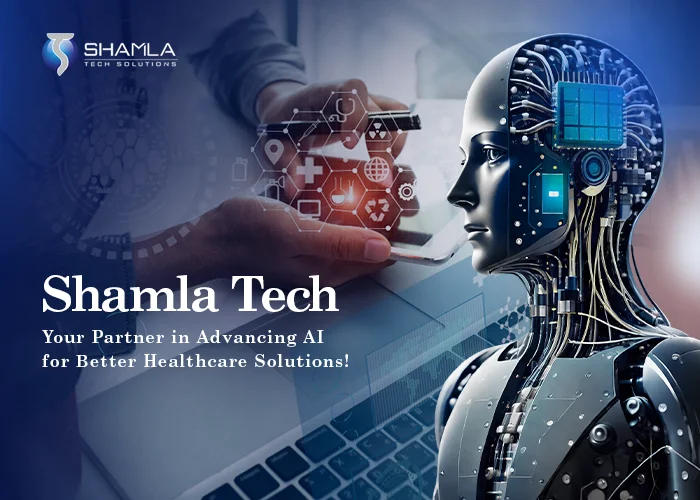Transforming the Future of Medicine
Artificial intelligence (AI) in healthcare is transforming the medical field, offering transformative potential across various facets of patient care and operational efficiency. AI technology in healthcare is not just a futuristic concept; it is actively shaping today’s healthcare industry. From enhancing diagnostic accuracy to personalizing treatment plans, AI in medicine and healthcare is proving invaluable. Companies are leveraging AI and machine learning in healthcare to predict disease, streamline administrative processes, and expedite drug discovery. The benefits of AI in healthcare are profound and multifaceted, promising a future where AI in healthcare companies and institutions leads to improved patient outcomes and optimized resource utilization. Here, we explore the top 10 benefits of artificial intelligence in healthcare, illustrating how AI is set to redefine the future of medicine.
What is Artificial Intelligence in Healthcare?
Artificial intelligence in healthcare refers to the seamless integration of cutting-edge technology, particularly artificial intelligence (AI), into various aspects of the healthcare industry to improve patient care, operational efficiency, and medical outcomes. This involves the development and deployment of algorithms and systems capable of analyzing large volumes of medical data, such as electronic health records, medical images, genomic data, and clinical notes, to assist healthcare professionals in decision-making processes. AI in healthcare encompasses a wide range of applications, including diagnostic assistance, personalized medicine, predictive analytics, administrative automation, drug discovery and development, telemedicine, and remote monitoring. By leveraging AI technologies such as machine learning, deep learning, natural language processing, and computer vision, healthcare organizations aim to enhance clinical workflows, optimize resource allocation, and ultimately improve patient outcomes.

10 Benefits of Artificial Intelligence in Healthcare
Artificial intelligence in healthcare is revolutionizing medicine, offering a multitude of benefits. From enhancing diagnostic accuracy to streamlining administrative tasks, AI in medicine and healthcare is transforming patient care and operational efficiency. The future of AI in healthcare promises even greater advancements and improved patient outcomes, solidifying its crucial role in the healthcare industry. The following are the top 10 benefits of artificial intelligence in healthcare:
1. Enhanced Diagnostic Accuracy
Artificial intelligence in healthcare significantly enhances diagnostic accuracy by leveraging advanced AI algorithms to analyze medical images, pathology slides, and genomic data with remarkable precision. Machine learning models, such as convolutional neural networks (CNNs) and deep learning frameworks, trained on vast datasets, detect patterns and. For instance, AI systems have demonstrated higher accuracy in identifying cancers, such as breast cancer in mammograms and skin cancer in dermatological images, compared to some experienced radiologists. This advancement in AI technology in healthcare not only improves diagnostic reliability but also facilitates early detection of diseases, ultimately saving lives. The integration of AI in the healthcare industry ensures continuous learning and improvement, as these systems adapt and become more accurate over time.
2. Personalized Treatment Plans
One of the top 10 benefits of artificial intelligence in healthcare is the development of personalized treatment plans. AI enables a more individualized approach to patient care by analyzing a patient’s genetic makeup, medical history, and current health conditions through techniques such as genomic sequencing and predictive modeling. This tailored approach increases the efficacy of treatments, reduces side effects, and improves overall patient outcomes. Precision medicine, driven by AI, is particularly promising in oncology, where treatments can be customized to target the specific genetic mutations of a patient’s tumor. The use of AI in the healthcare industry allows for continuous monitoring and adjustment of treatment plans based on real-time data, enhancing the effectiveness of therapeutic interventions and patient satisfaction.
3. Predictive Analytics for Proactive Care
Predictive analytics powered by AI and machine learning in healthcare can forecast potential health issues before they become critical. By analyzing historical and real-time data through advanced analytics and time-series forecasting, AI can predict the likelihood of conditions such as heart attacks, strokes, or diabetic complications. This proactive approach allows for early intervention and preventive measures, significantly improving patient prognosis and reducing healthcare costs. The benefits of AI in healthcare are evident in its ability to shift from reactive to proactive care, ensuring better health outcomes and optimizing the use of healthcare resources. Predictive models, such as regression analysis and decision trees, play a crucial role in identifying high-risk patients and enabling timely medical interventions.
4. Streamlined Administrative Processes
AI technology in healthcare streamlines administrative processes by automating tasks such as scheduling appointments, managing patient records, and processing insurance claims. This automation, facilitated by robotic process automation (RPA) and machine learning algorithms, reduces the administrative burden on healthcare staff, allowing them to focus more on patient care. Natural language processing (NLP) assists in transcribing and interpreting clinical notes, making it easier to maintain accurate and comprehensive patient records. AI in the healthcare industry thus enhances operational efficiency, reducing errors and improving the overall patient experience. Additionally, intelligent systems can optimize resource allocation and workflow management, further enhancing the efficiency of healthcare operations.
5. Improved Patient Engagement
Improved patient engagement is another significant benefit of AI in medicine and healthcare. AI-powered chatbots and virtual health assistants provide patients with 24/7 access to information and support through natural language understanding (NLU) and sentiment analysis. These tools can answer queries, offer medical advice, and remind patients to take their medications or follow up on appointments. Enhanced patient engagement leads to better adherence to treatment plans and improved health outcomes. As AI in healthcare companies continues to evolve, these intelligent systems will play an increasingly important role in supporting and empowering patients, leading to more active participation in their own healthcare. The integration of AI-driven patient portals and mobile health applications further enhances the accessibility and convenience of healthcare services.

6. Accelerated Drug Discovery and Development
AI accelerates the drug discovery process by analyzing complex biological data and identifying potential drug candidates more quickly than traditional methods. Utilizing techniques such as molecular modeling and virtual screening, AI can simulate how different drugs interact with various biological targets, streamlining the development process. This significantly reduces the time and cost of bringing new medications to market, potentially leading to more effective treatments becoming available sooner. The integration of artificial intelligence in healthcare companies is revolutionizing pharmacology by enabling the rapid identification of promising compounds and optimizing clinical trial designs. The benefits of AI in healthcare extend to the entire drug development pipeline, enhancing innovation and improving patient outcomes.
7. Enhanced Imaging and Radiology
Artificial intelligence in healthcare is transforming medical imaging by providing more accurate and detailed analyses. AI algorithms, particularly deep learning models, can enhance the quality of images, highlight areas of concern, and assist radiologists in making more accurate diagnoses. Techniques such as image segmentation and computer-aided detection (CAD) are especially valuable in detecting early signs of diseases such as cancer, where early intervention can significantly improve survival rates. AI in medicine and healthcare ensures that radiologists can rely on advanced tools to interpret complex images, reducing human error and increasing diagnostic precision. The future of AI in healthcare is poised to see even greater integration of these technologies, further enhancing the capabilities of medical imaging.
8. Virtual Health Assistants and Telemedicine
AI supports telemedicine by enabling remote monitoring and consultations, which is especially beneficial in the current digital age. Virtual health assistants, powered by AI and machine learning in healthcare, can collect and analyze patient data, provide recommendations, and escalate cases to human doctors when necessary. This expands access to healthcare, especially in remote or underserved areas, and allows for continuous monitoring of chronic conditions from the comfort of a patient’s home. AI technology in healthcare facilitates the creation of telehealth platforms that offer real-time interaction, improving patient engagement and adherence to treatment plans. The benefits of AI in healthcare are evident in the enhanced accessibility and efficiency of medical services, bridging gaps in traditional healthcare delivery.
9. Operational Efficiency in Healthcare Facilities
AI optimizes the operations of healthcare facilities by predicting patient admissions, optimizing staffing levels, and managing inventory. Predictive models, such as those using time-series analysis and machine learning algorithms, can forecast patient flow, helping hospitals allocate resources more effectively and reduce waiting times. This leads to better patient experiences and more efficient use of hospital resources. AI in the healthcare industry enhances operational efficiency by automating routine tasks and enabling data-driven decision-making. The future of AI in healthcare promises even greater improvements in facility management, ensuring that healthcare providers can deliver high-quality care while maintaining cost-effectiveness.
10. Enhanced Research and Data Analysis
AI can sift through vast amounts of research data to identify trends, correlations, and insights that might not be apparent through traditional analysis methods. Techniques such as natural language processing (NLP) and machine learning algorithms accelerate scientific discovery and enhance our understanding of complex diseases. AI-driven data analysis supports clinical trials by identifying suitable candidates and monitoring outcomes more accurately, ensuring robust and reliable results. The benefits of AI in healthcare research are profound, enabling researchers to uncover novel insights and develop innovative treatments. AI in healthcare companies is driving advancements in medical research, paving the way for breakthroughs that could transform patient care and improve public health outcomes.
These 10 benefits of artificial intelligence in healthcare highlight its indispensable role in modern medicine. The benefits of AI in healthcare are extensive, paving the way for a more efficient and personalized healthcare system. As artificial intelligence in medicine continues to advance, its impact on patient care and medical research will grow. The future of AI in healthcare holds immense potential for innovation and improved health outcomes, making it an indispensable part of modern medicine.

How to develop Artificial Intelligence in Healthcare?
Developing artificial intelligence in healthcare involves identifying use cases, collecting and preparing data, choosing appropriate AI techniques, and integrating solutions into healthcare systems to improve patient care. Let’s delve deeper into each step of developing artificial intelligence in healthcare:
1. Identify Use Cases:
Start by understanding the specific challenges or opportunities within healthcare that could benefit from AI solutions. This might involve areas like improving diagnostic accuracy, streamlining administrative tasks, optimizing treatment plans, or enhancing patient engagement and care delivery.
2. Data Collection and Preparation:
Gather diverse datasets from various sources such as electronic health records (EHRs), medical imaging archives, genetic databases, wearable devices, and patient-generated data. Ensure that the data is cleaned, standardized, and anonymized to protect patient privacy while maintaining its quality and integrity.
3. Choose AI Techniques:
Select appropriate AI techniques and algorithms based on the nature of the healthcare problem and the available data. Common AI techniques in healthcare include:
- Machine Learning: Supervised learning, unsupervised learning, and reinforcement learning methods for tasks like classification, regression, clustering, and anomaly detection.
- Deep Learning: Neural network architectures like convolutional neural networks (CNNs) for image analysis, recurrent neural networks (RNNs) for time-series data, and transformer models for natural language processing tasks.
- Natural Language Processing (NLP): Techniques for processing and analyzing human language data from clinical notes, medical literature, and patient communications.
- Computer Vision: Algorithms for interpreting and analyzing medical images such as X-rays, MRIs, CT scans, and histopathology slides.
4. Model Development:
Develop AI models tailored to the specific healthcare use cases, using the chosen techniques and algorithms. This involves:
- Feature engineering: Selecting relevant features or variables from the input data to train the model.
- Model architecture design: Designing the structure of the AI model, including the number of layers, nodes, and connections in neural networks.
- Training: Iteratively adjust the model parameters using labeled training data to minimize prediction errors and optimize performance metrics.
5. Validation and Testing:
Validate the AI models using separate datasets to ensure their accuracy, reliability, and generalizability across different patient populations and healthcare settings. Conduct rigorous testing to identify and address any potential biases or limitations, such as data imbalance, overfitting, or model drift.
6. Integration with Healthcare Systems:
Integrate the developed AI models into existing healthcare systems and workflows to ensure seamless interoperability and usability. This may involve:
- Developing application programming interfaces (APIs) or software libraries for easy integration with electronic health record (EHR) systems, medical devices, and clinical decision support tools.
- Implementing user-friendly interfaces or dashboards for healthcare providers to interact with AI-driven solutions and access actionable insights in real time.
7. Regulatory Compliance:
Ensure compliance with relevant healthcare regulations and standards, such as:
- Health Insurance Portability and Accountability Act (HIPAA) in the United States, which governs the privacy and security of protected health information (PHI).
- General Data Protection Regulation (GDPR) in the European Union, which regulates the processing and protection of personal data.
- Medical device regulations (e.g., FDA approval for AI-based medical devices) for ensuring safety, efficacy, and quality standards.
8. Clinical Validation:
Conduct clinical trials and real-world studies to evaluate the effectiveness and impact of AI-driven solutions on patient outcomes, healthcare costs, and clinician workflows. Collaborate with healthcare providers, researchers, and regulatory agencies to design robust study protocols, collect meaningful outcome measures, and interpret study results accurately.
9. Iterative Improvement:
Continuously monitor and evaluate the performance of AI models in real-world healthcare settings. Incorporate feedback from clinicians, patients, and other stakeholders to iteratively improve the accuracy, usability, and scalability of AI-driven solutions. This may involve:
- Fine-tuning model parameters based on new data or changing healthcare requirements.
- Updating algorithms to address emerging challenges or incorporate new research findings.
- Scaling up AI solutions to serve larger patient populations or expand to new healthcare domains.

10. Collaboration and Knowledge Sharing:
Foster collaboration between multidisciplinary teams, including clinicians, data scientists, software engineers, and healthcare administrators, to leverage diverse expertise and insights in developing AI solutions. Encourage open communication, knowledge sharing, and cross-functional collaboration within the organization and with external partners, research institutions, and industry stakeholders to advance the field of artificial intelligence in healthcare collectively.
The development of artificial intelligence in healthcare requires a systematic approach, collaboration across disciplines, and a commitment to regulatory compliance, clinical validation, and continuous improvement for meaningful impact on patient outcomes.
How much does Artificial Intelligence in Healthcare cost?
The cost of implementing artificial intelligence in healthcare can vary significantly depending on various factors such as the complexity of the AI solution, the size and scale of the healthcare organization, the quality and quantity of data available, and the specific use case being addressed.
For example, developing and deploying AI algorithms for diagnostic imaging or personalized medicine may require substantial investment in data collection, algorithm development, computational infrastructure, and regulatory compliance. Additionally, ongoing costs such as maintenance, training, and updates must be considered.
The cost of AI implementation in healthcare may include expenses related to:
- Data acquisition and preprocessing
- Software development and algorithm design
- Computational resources and infrastructure (e.g., cloud computing, high-performance computing)
- Regulatory compliance and certification (e.g., FDA approval for medical devices)
- Training and education for healthcare staff
- Integration with existing healthcare systems and workflows
- Maintenance and support services
- Research and development for continuous improvement and innovation.
While the initial investment in artificial intelligence in healthcare may be substantial, the potential benefits, including improved patient outcomes, increased efficiency, and cost savings, can justify the expense over time. Moreover, as AI technology advances and becomes more accessible, the cost of implementation is likely to decrease, making it more feasible for healthcare organizations of all sizes to leverage AI solutions for better patient care.
Future of Artificial Intelligence in Healthcare
The future of artificial intelligence in healthcare is pivotal, with the potential to transform patient care and treatment methodologies. Predictive analytics will evolve to anticipate health risks and diseases even before symptoms manifest, allowing for proactive interventions and preventive measures. Remote patient monitoring will become seamless and unobtrusive, empowering patients to manage their health from anywhere while enabling healthcare providers to intervene promptly when needed. Virtual health assistants will evolve into intelligent companions, offering personalized guidance, support, and even companionship, enhancing patient engagement and adherence to treatment plans. Moreover, AI will continue to fuel breakthroughs in diagnostic accuracy, drug discovery, and clinical decision-making, transforming healthcare delivery and improving patient outcomes.
Machine learning, a core component of AI, is driving the advancement of precision medicine, addressing critical gaps in healthcare delivery. While initial efforts in diagnosis and treatment recommendations have faced challenges, ongoing advancements indicate AI’s eventual mastery in these domains. AI’s rapid progress in imaging analysis suggests that radiology and pathology images will increasingly undergo automated scrutiny, streamlining diagnosis processes.
However, the widespread adoption of AI in healthcare faces hurdles. Regulatory approval, integration with Electronic Health Record (EHR) systems, standardization, clinician training, funding mechanisms, and ongoing updates pose significant challenges. Overcoming these obstacles is crucial for AI’s integration into daily clinical practice. While these challenges may delay full-scale adoption, incremental progress is expected, with limited AI usage in clinical settings within five years and more extensive integration within a decade.
In the future, artificial intelligence in healthcare will push the boundaries of personalized medicine, leveraging vast datasets to tailor treatments based on individuals’ genetic makeup, lifestyle factors, and medical history. It’s evident that AI will augment rather than replace human clinicians, enhancing their capabilities in patient care. Clinicians may gradually transition to roles that leverage uniquely human attributes like empathy, communication, and holistic patient management. While AI may reshape job roles, clinicians who embrace collaboration with AI are likely to enhance patient care outcomes, with AI serving as a complementary tool rather than a substitute for human expertise.
Shamla Tech: Pioneering the Future of Artificial Intelligence in Healthcare
At Shamla Tech, we understand the transformative power of artificial intelligence in healthcare and are committed to facilitating its seamless integration into medical practices worldwide. Leveraging our expertise in AI technology and healthcare solutions, we strive to empower healthcare organizations with innovative AI-driven tools and services that enhance patient care, operational efficiency, and medical outcomes.
Our comprehensive approach to AI integration in healthcare encompasses the following key areas:
Cutting-edge Solutions: We develop state-of-the-art AI solutions tailored to the specific needs and challenges of healthcare providers, leveraging advanced machine learning algorithms, deep learning frameworks, and natural language processing techniques. Our solutions span a wide range of applications, including diagnostic assistance, personalized treatment planning, predictive analytics, and administrative automation.
Collaborative Partnership: We collaborate closely with healthcare organizations, clinicians, researchers, and industry experts to co-create and implement AI-driven solutions that address real-world healthcare challenges. By fostering a culture of collaboration and knowledge sharing, we ensure that our solutions are grounded in clinical expertise and aligned with the evolving needs of the healthcare industry.
Regulatory Compliance: We prioritize regulatory compliance and data privacy in all our AI solutions, adhering to industry standards such as HIPAA and GDPR to ensure the security and confidentiality of patient information. Our rigorous approach to compliance ensures that our solutions meet the highest standards of quality, safety, and ethical conduct.
Continuous Innovation: We are committed to continuous innovation and improvement, staying abreast of the latest developments in AI technology and healthcare research. Through ongoing research and development initiatives, we strive to push the boundaries of AI in healthcare, unlocking new possibilities for improving patient outcomes and advancing medical science.
Empowering Healthcare Providers: Above all, we are dedicated to empowering healthcare providers with the tools and resources they need to deliver high-quality, patient-centered care. By harnessing the power of artificial intelligence in healthcare, we aim to transform the future of medicine, driving positive change and improving the lives of patients around the world.
Shamla Tech is at the forefront of the AI revolution in healthcare, offering innovative solutions that harness the full potential of artificial intelligence to transform patient care, enhance operational efficiency, and shape the future of medicine. With our expertise, commitment, and collaborative approach, we are proud to be a trusted partner in the journey towards a healthier, more sustainable healthcare ecosystem.








